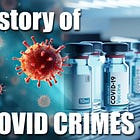Dr. Rimas Jankunas Explores Flawed Trials and COVID Injection Harms
Dr. Jankunas highlights manipulated studies, failed oversight, and catastrophic harms during the COVID “pandemic”
Having served as deputy director of the Lithuanian State Medicines Control Agency, Dr. Rimas Jankunas has deep expertise in clinical trials, drug regulation, and pharmacovigilance. He highlights how flawed trial design, regulatory capture, and failed safety surveillance created a system that concealed dangers while promoting mass injection campaigns.
The World Council for Health (WCH) is an independent, non-profit organization dedicated to empowering people with trustworthy information about health and sovereignty, enabling them to make meaningful and informed choices. Supporting the WCH is an investment in your health, your family’s well-being, and our collective freedom. Learn more at worldcouncilforhealth.org and consider contributing at worldcouncilforhealth.org/donate.
There are now 41 WCH Country Councils around the world, and the number continues to grow: view them here. We are deeply grateful to WCH Estonia for organizing and hosting this important conference.
Dr. Rimas Jankunas is a Lithuanian pharmacologist with more than 30 years of medical experience:
Researcher Profile: lsmu.lt
Institute Page: archyvas.lsmu.lt
Flawed Clinical Trials and Misleading Efficacy
Dr. Rimas Jankunas demonstrates that the clinical trials used to authorize the COVID “vaccines” were structurally unsound. Trial stratification placed individuals aged 16 to 64 into the same category, erasing meaningful distinctions between groups with vastly different risks. Those whom the “vaccines” were allegedly meant to benefit most—the elderly—were severely underrepresented.
Follow-up periods averaged only three to four months, an interval far too short to detect delayed adverse events. Dr. Jankunas says that the often cited 91% efficacy figure was based on relative risk reduction, masking the reality that the absolute risk reduction was as low as 2–3%. Such omissions violated European Medicines Agency guidelines requiring disclosure of absolute benefit.
Conditional Authorization and Government Misinformation
The products received conditional marketing authorization, bypassing full evaluations of efficacy and safety. No trials were conducted on their impact on transmission. Despite this, Dr. Jankunas explains, the Estonian government declared the injections 100% effective against hospitalization and death.
Pharmacovigilance Breakdown
Dr. Jankunas exposes the collapse of pharmacovigilance systems meant to protect public health. In Lithuania, regulators recorded only 35 deaths following COVID “vaccination,” while national statistics reported nearly 5,000 deaths within three months of injection. This suggests that fewer than 1% of adverse events were acknowledged. Similar patterns appeared across Europe, where reporting rates also fell below 1%. Independent initiatives to encourage citizens to file reports were actively obstructed, resulting in the loss of critical safety data.
Case Study: A Preventable Tragedy
To illustrate real-world consequences, Dr. Jankunas presents the case of a 17-year-old male who died from cerebral venous sinus thrombosis after receiving a COVID “vaccine.” The condition was initially misdiagnosed as migraine, and by the time appropriate treatment was attempted, it was too late. Laboratory findings revealed abnormal coagulation, extremely high antibody titers, and elevated cardiac markers.
Spike protein expression can provoke autoimmune reactions and clot formation, a mechanism consistent with numerous reports of thrombosis documented in European safety databases. Despite the 17-year-old meeting the criteria for a “vaccine”-related death report, no such report was filed.
Final Warnings and Recommendations
Dr. Jankunas concludes with urgent recommendations. Long-term efficacy and safety endpoints must be mandatory in all vaccine trials. Fatal and life-threatening events following “vaccination” should undergo independent review, with clinicians trained to recognize unexpected reactions. He also stresses that transparency and accountability are essential to prevent repeats of past medical disasters such as thalidomide.
Ultimately, the failures of trial design, regulatory oversight, and pharmacovigilance during the COVID “pandemic” represent not isolated mistakes but systemic breakdowns that demand urgent correction.






